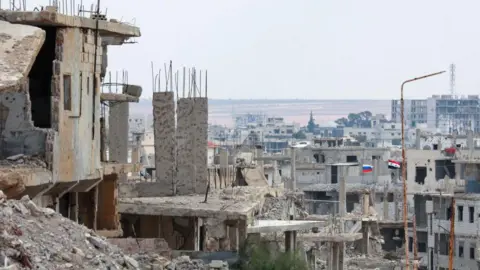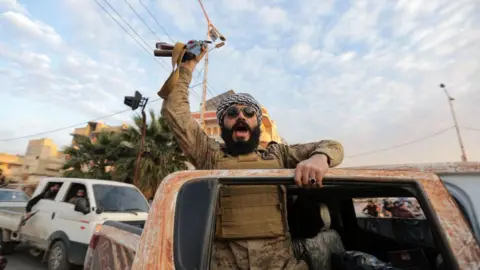 AFP
AFPRebel forces in southern Syria have reportedly captured most of the Deraa region – the birthplace of the 2011 uprising against President Bashar al-Assad.
A UK-based war monitor reports that the “local factions” were able to take control of many military sites there following “violent battles” with government forces.
According to Reuters news agency, rebel sources say they had reached a deal for the army to withdraw and for military officials to be given safe passage to the capital, Damascus – roughly 100km (62 miles) away.
The BBC has been unable to independently verify these reports, which come as Islamist-led rebels in northern Syria claimed to have reached the outskirts of the city of Homs.
The Syrian Observatory for Human Rights (SOHR), a UK-based war monitor, said on Friday that the rebels in the south controlled more than 90% of the Deraa region and that only the Sanamayn area was still in government hands.
Deraa city has both strategic and symbolic importance. It is a provincial capital and is close to the main crossings on the Jordanian border, while also being where pro-democracy protests erupted in 2011 – sparking the country’s ongoing civil war, in which more than half a million people have been killed.
Jordan’s interior minister said the country had closed its side of the border as “a result of the surrounding security conditions in Syria’s south”.
Meanwhile, government officials in the city of Suweida – about 50km east of Deraa – are reported to have fled the city following clashes between security forces and militias from the minority Druze sect, which is predominant in the region.
Ryan Marouf, an activist and editor of news website Suwayda 24, told Reuters that “people are seeing what is happening in the rest of Syria as liberation of Syria and a chance to bring down the regime”.
Elsewhere, Kurdish-led forces say they have taken the city of Deir Ezzor, the government’s main foothold in the vast desert in east of the country.
And in the north, the main rebel offensive has reached the outskirts of the strategic city of Homs. The Syrian military and its Russian allies are fighting back, with air strikes killing 20 civilians in the city’s suburbs on Friday.
And crucially, officials quoted in the New York Times say President Assad’s other key ally, Iran, has begun to evacuate its military commanders and personnel.
It has been just over a week since rebels in the north launched their lightning offensive – the biggest against the Syrian government in years, which has exposed the weakness of the country’s military.
At least 370,000 people are thought to have been displaced so far as a result of the rebel offensive, according to the UN, which has said the fighting is also “worsening an already horrific situation for civilians in the north of the country”.
Some civilians are trapped in front-line areas unable to reach safer locations.
SOHR says more than 820 people, including 111 civilians, have been killed across the country since the Islamist-led rebels began their offensive last week.
They seized Hama, to the north of Homs, on Thursday – a second major blow to President Assad, who lost control of Aleppo last week.
The leader of the Islamist militant group Hayat Tahrir al-Sham (HTS), Abu Mohammed al-Jawlani, told residents of Homs “your time has come”.
The rebels have been advancing south, and Homs would be the next stop on the road to the Damascus.

Terrified members of President Assad’s Alawite minority community are rushing to leave Homs, with video footage showing roads jammed with cars.
“Our forces have liberated the last village on the outskirts of the city of Homs and are now on its walls,” the Syrian faction leading the assault said on Telegram.
The BBC has not been able to verify these movements, but SOHR earlier reported that rebels were within a few kilometres of the city.
The SOHR said Russian warplanes had bombed a bridge in nearby Rastan to try and slow the rebel advance.
After the Syrian military lost control of Hama following days of fighting, it is not clear whether it will be able to defend Homs.
The defence ministry has denied claims it had withdrawn troops from the strategic city, which links the capital Damascus to the Alawite heartland on the Mediterranean coast.
The Alawites are a minority sect of Shia Muslims from which the Assad family originates.
They have long formed a major support base for Assad rule, and are key to the president’s grip on power.
Assad has vowed to “crush” the rebels and accused Western powers of trying to redraw the map of the region.
But analysts say his forces are demoralised, dealing with low pay and corruption in the ranks. He announced a 50% pay rise in recent days, according to state news agency Sana.
Russia and Iran, the regime’s most important allies, have declared continued support for Assad,
But they have not provided the kind of military assistance that so far has been propping up his rule, and Moscow is now urging Russian nationals to leave the country.
The US on Friday also advised its citizens to leave Syria “while commercial options remain available in Damascus”.
 Getty Images
Getty ImagesThe Kremlin is preoccupied with its war in Ukraine, and Iran has been weakened by Israel’s punishing campaign against its most powerful allied militia, Lebanon’s Hezbollah.
Hezbollah, whose fighters had been key to holding regime territory in Syria, are now largely absent from the battlefield, although reports in the Lebanese and Israeli press say small numbers have crossed the border to shore up Homs’ defence.
Russian and Iranian officials are expected to meet with their Turkish counterparts at the weekend to discuss a response to this upsurge in Syria’s civil war.
Turkey backs some of the rebel groups and its president Recep Tayyip Erdogan has for months pressed Mr Assad to reach a political solution with the opposition.
He has voiced support for the rebels’ recent advances, and said the offensive would not have happened if Assad had responded to his calls.
Analysts say it almost certainly could not have happened without Ankara’s knowledge and approval.
For his part, the leader of HTS, Abu Mohammed al-Jawlani, has been making public remarks to soften his image and reassure both Syrians and foreign leaders.
He has emphasized his split years ago from Islamic State and Al Qaeda, presenting himself as a nationalist opposed to attacks outside Syria, and promising protection for minority communities.
In an interview with CNN, al-Jawlani said the goal of the rebel forces was to overthrow the Assad regime and install a government that represents all Syrians.
Earlier, HTS fighters and their allies took over Hama and released inmates from its central prison amid fierce battles, while the military said it had redeployed troops outside the city.
Hama is home to one million people and is 110km south of Aleppo, which the rebels captured last week.
In Aleppo, a city of two million people, some public services and critical facilities – including hospitals, bakeries, power stations, water, internet and telecommunications – are disrupted or non-functional because of shortages of supplies and personnel.
UN Secretary-General Antonio Guterres urged “all those with influence to do their part” to end the civil war.
With additional reporting by Maia Davies

